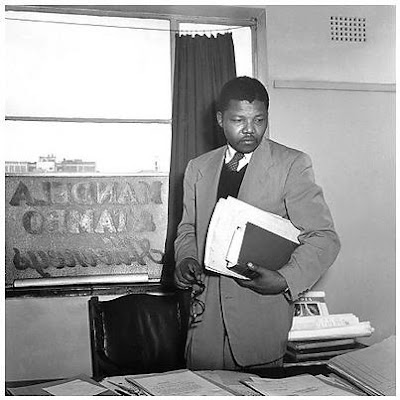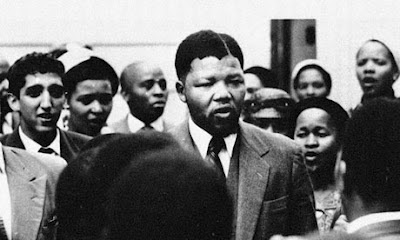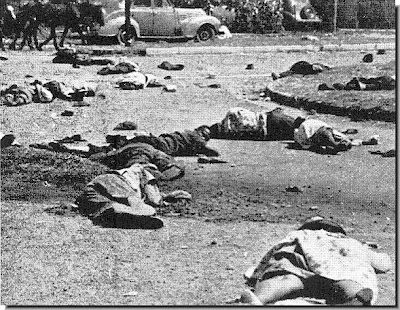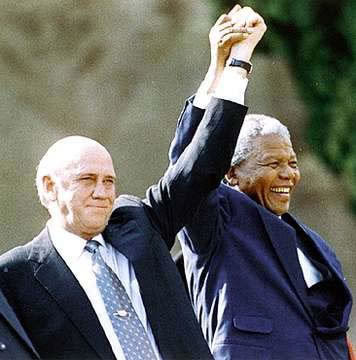18
July 1918
Rolihlahla
Mandela is born in a small South African village called Mvezo,
a small village located in
the
district of Umtata.
1925
Mandela
becomes the first person in his family to go to school. His teacher,
Miss Mdingane gives him the name Nelson
after having difficulty pronouncing his real name.
1937
Having
passed his Junior Certificate in two years at Clarkebury Boarding
Institute Mandela joins Healdtown, a college in Fort Beaufort.
1941
Mandela
flees to Johannesburg, to avoid an arranged marriage. There he meets
Walter Sisulu and begins work at his law firm as an articled clerk.
He completed his B.A. degree at the University of South Africa via
correspondence, after which he began law studies at the
University of Witwatersrand.
1944
Two
years after joining the African National Congress (ANC), Mandela and
60 other young members form the ANC Youth League.
1948
The
National Party comes to power which supported the apartheid
policy of racial segregation. The ANC launch a
campaign of passive resistance against the laws. They later begin the
Campaign for the Defence of Unjust Laws.
1952
Mandela
sets up the country's first black law firm with Oliver Tambo. They
provide legal services to those who would have normally had no
representation.
 |
| 1952 |
1953
The
ANC is concerned that it will be banned so Mandela is tasked with
ensuring the party can work underground.
1956
Initially
committed to nonviolent resistance, along with
155 others Mandela is arrested and charged with treason. After a
four-year trial, the charges are dropped.
 |
| 1956 |
1960
21 March
Police
kill 69 people, including women and children, as black people protest
in Sharpeville against restrictions on their freedom of movement. A
state of emergency is declared, amid fears of retaliation, and the
ANC is banned.
 |
| Sharpeville massacre |
1961
The
ANC concludes that peaceful protest is not enough to combat apartheid
and forms an underground military wing, Umkhonto we Sizwe (Spear of
the Nation). Mandela, now vice-president of the ANC, is appointed as
the group's first leader.
1962
Having
spent a year underground, Mandela is arrested for leaving the country
illegally. He is sentenced to five years in jail.
1963
While
Mandela is in prison, fellow ANC members are arrested. They are
charged with sabotage and treason, along with Mandela. The men appear
in court in Rivonia.
1964
12 june.
In
his statement from the dock at the opening of the defence case in the
trial on 20 April 1964 at Pretoria Supreme Court, Mandela laid
out the reasoning in the ANC's choice to use violence as a tactic.
His statement described how the ANC had used
peaceful means to resist apartheid for years until the
Sharpeville Massacre.
At the end of the eight-month
trial, Mandela and seven other defendants are given life sentences
and taken to prison on Robben Island.
1982
March
Mandela
was imprisoned on Robben Island where he remained for the next
eighteen of his twenty-seven years in prison. Mandela
and fellow ANC leaders are transferred to Pollsmoor Prison in 1982.
11
February 1990
Mandela
is freed after 27 years, as a result of a relaxation of apartheid
laws and the lifting of the ban on the ANC. He is greeted by large
crowds as he and wife Winnie leave the prison grounds.
1991
At
the ANC's first national conference in South Africa, Mandela is
elected president of the party.
1993
Mandela,
along with South African President FW De Klerk, is awarded the Nobel
Peace Prize for efforts to bring stability to South Africa. Accepting
the award, Mandela
says:
"We will do what we can to contribute to the renewal of our
world."
 |
| Nelson Mandela and F W De Klerk |
27
April 1994
South
Africans, including Nelson Mandela, vote in the country's first
democratic election. Mandela, leader of the ANC, is elected as the
country's first black president.
10
May 1994
Nelson
Mandela addresses the crowds at his inauguration, saying: "Let
freedom reign, God bless Africa!" Thabo Mbeki, Mandela's deputy,
takes over the day-to-day running of government, leaving Mandela to
promote the country around the world.
1995
February
To
mark the fifth anniversary of his release, Nelson Mandela visits
Robben Island, the prison he was held in for 18 years.
1999
Thabo
Mbeki takes over from Mandela as president of South Africa and goes
on to win the 1999 presidential election.
2001
Mandela
is diagnosed with prostate cancer and begins a course of radiation.
2004
Announcing
his retirement from public life, Mandela says he plans to enjoy a
quieter life and spend more time with his family. Joking with
reporters, he says: "The appeal therefore is don't call me, I'll
call you."
2007
Despite
his retirement, Mandela forms The Elders. The group, which includes
Archbishop Desmond Tutu and other statesmen and women, aims to help
tackle the world's problems.
2008
Musicians, film stars and politicians join Mandela at a concert in London's Hyde Park to celebrate his 90th birthday. Speaking to the crowd he says "It is time for new hands to lift the burdens, it is in your hands now."
Musicians, film stars and politicians join Mandela at a concert in London's Hyde Park to celebrate his 90th birthday. Speaking to the crowd he says "It is time for new hands to lift the burdens, it is in your hands now."
Sources -: BBC
No comments:
Post a Comment